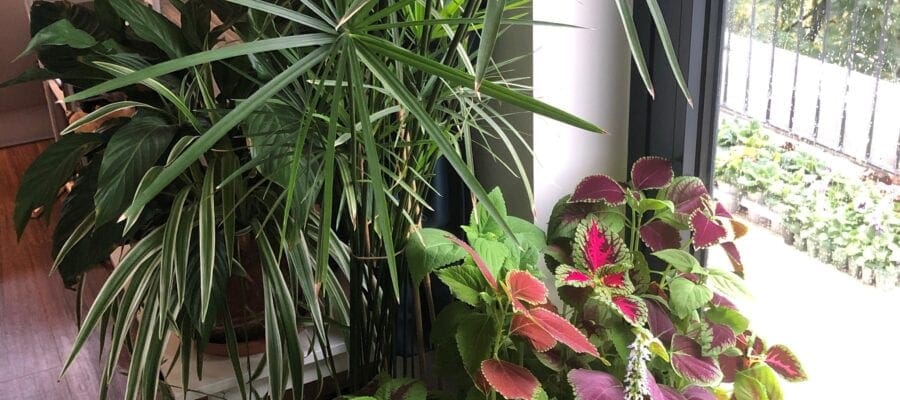The mental health benefits of gardening were well demonstrated during the national lockdown when many couch potatoes turned into avid amateur gardeners.
Now the days are getting shorter and crisper you may not want to spend as much time outdoors but you can still reap the rewards of gardening by growing a variety of houseplants in your own home.
Enjoy more Kitchen Garden reading in the monthly magazine.
Click here to subscribe & save.
Chris Collins, Head of Organic Horticulture at national charity, Garden Organic has found that growing plants indoors has given him many of the mental health benefits he achieved while working outdoors.
Chris says “Flat sharing with my wonderful green friends is one of the highlights of my home. Getting in after a busy day’s work, their presence immediately relaxes me. They soften the hardness of the rooms, create different shapes and colours and exude a feeling of peace. It is easy to take these incredible plants for granted but at the end of the day I couldn’t imagine life without them”.
As increased Covid restrictions mean we are all likely to be spending more time indoors this winter sharing our homes with houseplants could be a lifeline for many of us.
Chris’s advice for all budding indoor gardeners is as follows:
Composting
“The most important thing is the compost, if you get that wrong everything else will go wrong. Using a mix of 7 parts organic peat free compost, 2 parts bark and loam mixed with a few comfrey pellets to provide an organic feed is the most successful combination”, he says.
“Don’t be afraid of getting your hands dirty and thoroughly mix it all together.”
What to grow
Most houseplants come from tropical origins and make great houseplants, they are quite happy in a pot. He suggests: “mixing a few together in one pot to make a tropical rainforest always works well.
“In a large pot you could plant a lovely Weeping Fig (Ficus benjamina) at the back and then smaller plants in front such as Anthurium, which provide beautiful coloured flowering bracts, a Peace Lilly (Sapthiphyllum) or a trailing Tradescantia. These plants can easily be bought from specialist growers or garden centres or, for the most sustainable option, you could take cuttings from friends.
“The bigger the pot or the trough the larger the plants will grow. Don’t forget to top dress with a handful of bark.
How to care for your plants: watering
“The most important thing is to get your watering right. While in spring and summer you need to water houseplants regularly, every couple of days to keep them moist but not soaking, in autumn and winter watering needs to be cut right down. In winter it may only be needed once every 3 weeks. But you must keep checking your soil, don’t just walk past, give them the attention they deserve and they will reward you with their health and beauty. Water is a precious resource so while rainwater is in plentiful supply you could collect it in a water butt or bucket to use for your houseplants.
How to care for your plants: Temperature and light conditions
“Temperature change is a problem for houseplants”, says Chris. “Try not to place them near radiators which will give sudden changes in temperature and can dry out their tips or cause leaves to drop. A steady temperature without direct heat is best. They also need light but not direct sunlight “.
How to keep pests at bay
Chris explains: “Just like in the garden pests can invade your indoor plants. The best way to deter them is by keeping plants strong using an organic foliage feed such as a seaweed extract and mist it on.
“If you spray plants to achieve humidity around them it stops the annoying red spider mites who hate getting their feet wet!
“If your plants acquire mealy bugs or scale try and scrape them off with your nail. If it is really bad cut out the effected parts or if it is all over the plant you will sadly have to get rid of the plant to stop it spreading.
“If you have tiny black flies, the Sciarid fly, they are usually caused by poor compost and over watering, so change the compost and only water when necessary”.
If you follow all these simple tips you will be rewarded with plants that will not only bring character to your home and complement your furnishings but an environment which will help you relax, boost your mood and reduce your anxiety. Some studies have also claimed that if you work from home plants can boost your productivity and spark your creativity. So your boss will be happy too!
If you would like to see Chris demonstrate these tips watch him on Youtube at https://www.youtube.com/watch?v=gkRm2RYjpjk
For further advice on growing houseplants or any gardening tips you can also visit www.gardenorganic.org.uk
 Enjoy more Kitchen Garden reading in the monthly magazine. Click here to subscribe.
Enjoy more Kitchen Garden reading in the monthly magazine. Click here to subscribe.
Sign-up to the Kitchen Garden Magazine Newsletter
Enter your e-mail address below to see a free digital back issue of Kitchen Garden Magazine and get regular updates straight to your inbox…
You can unsubscribe at any time.
About the Author
- RHS Chelsea Flower Show 2024: The Bowel Research UK’s Microbiome Garden - 9th April 2024
- GARDENING CHARITY URGES GARDENERS TO DITCH PEAT - 4th April 2024
- Every Garden Matters in the fight to stem biodiversity loss - 27th March 2024









